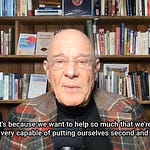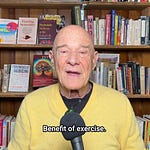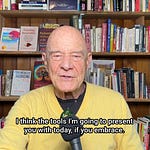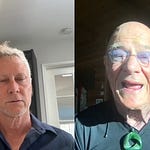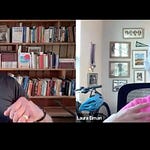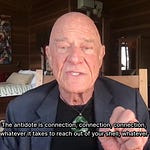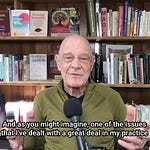Dear Friends,
I recently had the pleasure of engaging in conversation with the Rev. Dr. Adam Robersmith, DMin, PhD – a fascinating character who wears many hats: Unitarian Universalist minister, spiritual director, ecotheologian, and scholar.
Our discussion explored his research on “public intimacy” and the multifaceted nature of human connections.
Here are some of the highlights from our conversation:
The Concept of Public Intimacy
First, Robersmith introduced me to the intriguing concept of public intimacy – the act of revealing a genuine self in a public setting. This concept spans various professions including actors, activists, clergy, and sex workers. Adam has a unique perspective as someone who has been trained as an actor and dancer, and now practices as a clergyman. He shared his extensive research on how different individuals and professionals navigate the boundaries between their private selves and their public personas:
“We all have these facets of ourselves that we show to different people in different contexts. Learning how to manage these facets and maintain integrity in all aspects of our lives is crucial for personal and professional well-being.”
Professional and Public Intimacy: Drawing Boundaries
Interestingly, both clergy and sex workers are keenly aware of maintaining clear boundaries to protect their personal well-being and professional integrity.
“Actors and activists generally don't seem as concerned with maintaining these boundaries. In contrast, clergy and sex workers are very aware of the need for a clear separation between their public personas and their private lives.”
The Intersection of Clergy Work and Public Intimacy
As we discussed, clergy have a unique position in public intimacy. They often share deeply personal experiences to foster connections within their congregations, but they must also maintain a degree of separation to sustain their personal space and mental health.
“Being able to understand and manage your public and private self in a safe and healthy way is critically important for the longevity and impact of their ministry.”
The Psychiatric and Social Impacts of Hypocrisy and Secrecy
We discussed how public figures, including clergy, can cause significant psychological harm when their personal actions starkly contrast with their public declarations:
“It’s devastating for congregations to learn that their leaders have been living double lives. Helping people in public roles to integrate their personal and professional selves is crucial in preventing such destructive outcomes.”
Thank you, Rev. Dr. Adam Robersmith, for your thoughtful contributions and to all our listeners for tuning in. Remember, good health in mind, body, and community is worth striving for, and is essential for life, liberty, and the pursuit of happiness.
Until next time,
Dr. Richard Louis Miller
P.S. Don't forget to check out our archives. And if you're on Instagram, give me a follow and comment "be happy" for some free literature. Let's spread the word and help people benefit from these free health tips!
Coming Soon: Psychedelic Medicine at the End of Life
You can now pre-order my latest book, Psychedelic Medicine at the End of Life: Dying Without Fear (release date: November 5). This work represents a culmination of my decades-long journey as a clinical psychologist, exploring how psychedelics can transform our approach to death and dying.
The book examines how substances like LSD, MDMA, and psilocybin can be powerful tools in confronting our fears of mortality, ultimately leading to richer, more fulfilling lives. I'm honored to include insights from renowned experts in the field, as well as my own experiences.
Here's what some esteemed colleagues are saying:
James Fadiman, Ph.D., calls it "a deeply uplifting, clear, and compassionate guide to dying and how psychedelics, used correctly, diminish our fears about approaching the door that opens at the end of our life."
Charles S. Grob, M.D., describes it as "a masterful overview of an area of vital importance to our modern world... a valuable resource and contribution to the growing field of psychedelic medicine."
Julie Holland, M.D., notes that "Psychedelics may offer a mini-death rehearsal, offering a glimpse of spiritual oneness, enabling us to be less afraid at the end of our lives."
I hope this book will inspire meaningful conversations and new perspectives on how we approach the end of life.
My Books:
Psychedelic Medicine at the End of Life: Dying Without Fear (release date: November 5)
Freeing Sexuality: Psychologists, Consent Teachers, Polyamory Experts, and Sex Workers Speak Out
Psychedelic Wisdom: The Astonishing Rewards of Mind-Altering Substances
Psychedelic Medicine: The Healing Powers of LSD, MDMA, Psilocybin, and Ayahuasca
Integral Psychedelic Therapy (co-edited with Jason A. Butler & Genesee Herzberg)

